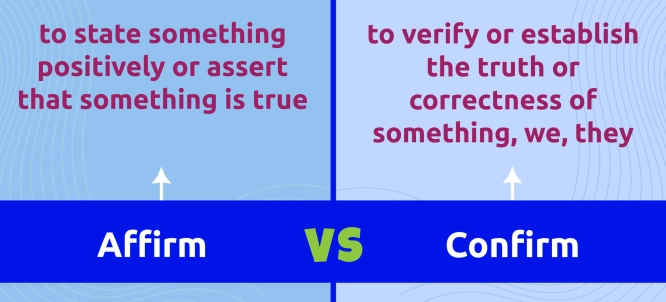by PushtoLearn
Affirm vs Confirm
Table of Contents
Affirm vs Confirm - Exercise
This exercise focuses on Affirm vs Confirm
Question:
A co-worker uses “affirm” a lot, when I think he should be using “confirm”. It just sounds weird. Like he’s trying to make it sound more official or something. Is he using affirm correctly?
Answer:
He is technically correct, but I agree, it sounds weird. It could be a regional thing, or maybe some quirky habit he picked up somewhere.
Understanding the Difference
Affirm
Theory:
"Affirm" means to state something positively or assert that something is true. It is often used in legal, formal, or philosophical contexts.
Rules:
-
Use "affirm" to express support or agreement with a statement or belief.
-
It can also mean to uphold or defend something, such as a legal decision.
Examples:
➡️ The witness affirmed that she saw the suspect at the scene.
➡️ He affirmed his commitment to the company's values.
➡️ The court affirmed the previous ruling.
Common Errors:
❌ Incorrect: He confirmed his belief in the project.
This can be correct in some contexts, but "affirmed" is more suitable for expressing strong support or belief.
✔️ Correct: He affirmed his belief in the project.
Confirm
Theory:
"Confirm" means to verify or establish the truth or correctness of something. It is often used in everyday situations to ensure accuracy or certainty.
Rules:
-
Use "confirm" to check or verify information or details.
-
It can also mean to finalize or approve something, such as a reservation or appointment.
Examples:
➡️ She confirmed the meeting time with her boss.
➡️ The airline confirmed my flight reservation.
➡️ Can you confirm the address for the delivery?
Common Errors:
❌ Incorrect: The manager affirmed the appointment for next week.
✔️ Correct: The manager confirmed the appointment for next week.

Everyday Use
Using these verbs correctly can help in both professional and personal settings. Remember:
⭐ Use "affirm" to assert or uphold a statement or belief.
⭐ Use "confirm" to verify or finalize details or information.
Examples in Sentences
➡️ She affirmed her faith in the team's success.
➡️ He confirmed the details of the contract with the client.
➡️ The president affirmed the country's commitment to peace.
➡️ Please confirm your attendance at the event.
Common Errors and Corrections
❌ Incorrect: The teacher confirmed the student's answer was correct.
✔️ Correct: The teacher affirmed the student's answer was correct.
❌ Incorrect: Can you affirm the date of the meeting?
✔️ Correct: Can you confirm the date of the meeting?
❌ Incorrect: They confirmed their dedication to the project.
✔️ Correct: They affirmed their dedication to the project.
❌ Incorrect: He affirmed the reservation for dinner.
✔️ Correct: He confirmed the reservation for dinner.
You may also like exploring other confusing vocabulary pairs: Incoming and Upcoming, Creampie or Cream Pie, Affect vs Effect, Then vs Than, Fiend vs Feen, Fate vs Destiny
FAQ
What is the main difference between "affirm" and "confirm"?
"Affirm" means to state positively or assert something, often in a formal context. "Confirm" means to verify or establish the truth or accuracy of something.
Can "affirm" and "confirm" be used interchangeably?
No, they cannot be used interchangeably. "Affirm" is used for asserting or upholding beliefs or statements, while "confirm" is used for verifying information or details.
How do I use "affirm" in a sentence?
Use "affirm" to state or assert something positively. For example, "She affirmed her commitment to the cause."
How do I use "confirm" in a sentence?
Use "confirm" to verify or finalize details. For example, "He confirmed the meeting time with his colleagues."
Are there any common phrases with "affirm" or "confirm"?
Yes, common phrases include "affirm one's belief" and "confirm a reservation."

